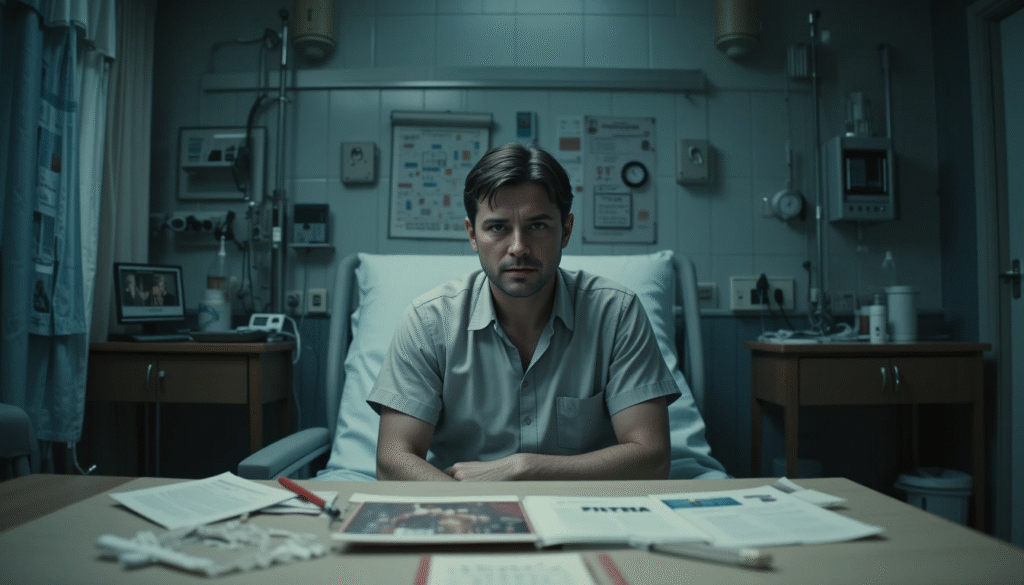Introduction: When Weight Loss Becomes Regret
Weight loss surgery is for many an ultimate resort, a gateway to a new life of health and confidence. But for a few, it leads somewhere else. Consider Sarah, a 36-year-old mother who once thought gastric sleeve surgery would end her life-long struggle with obesity. A year afterward, she is fighting not only with her health, but also with regret, loneliness, and intense emotional exhaustion. “Gastric sleeve surgery ruined my life,” she says softly, something she never thought she would say.
Sleeve gastrectomy, or gastric sleeve surgery, is a surgical operation during which most of the stomach is excised, leaving only a narrow, tube-like “sleeve” behind. The objective is straightforward: limit food consumption, foster weight loss, and enhance overall well-being. And for some, it’s effective. But little notice is taken of the fact that this surgery is not a blanket remedy and not all results are favorable.
This article explores the other side of the story. The side where life after surgery doesn’t feel like a triumph. The physical pain, nutritional complications, emotional toll, and mental strain some patients face are very real and deeply human. Because sometimes, even the most well-intentioned decisions lead to unexpected consequences.
Common Gastric Sleeve Regrets People Don’t Talk About
Not everyone speaks of what occurs post-surgery, the silent times when the weight is slipping away, but the heart is weighed down. Most patients experience a disconnect from emotions following gastric sleeve surgery. They shed weight, but shed something more: joy, hunger, self.
Favorite foods are forbidden. Social dinners become stressful moments. Some complain that they are stuck with a body that no longer desires what the brain wants.
Next come sudden changes: mood swings, irritability, even depression. For many, these changes weren’t part of the plan. And though doctors tend to emphasize the advantages, the gastric sleeve regrets are seldom spoken out loud.
It’s not about faulting the procedure, it’s about being realistic that not all transformations are a win.
Unexpected Complications After Gastric Sleeve Surgery
For others, the operation is fine but the actual difficulties arise in recovery. Gastric sleeve complications may appear early or much later on, suddenly catching patients by surprise.
Others confront serious surgical complications such as internal bleeding, infection, or adverse reaction to anesthesia. Some have ongoing nausea, vomiting, or ulcers that make everyday living a pain.
There’s also the silent harm nutritional deficiencies. Since the stomach is smaller, it can take in fewer vitamins and minerals. Unless carefully watched, patients can become tired, dizzy, or have long-term health issues such as anemia or loss of bone density.
Recovery also isn’t always what people expect. Instead of a quick bounce-back, many face weeks or months of exhaustion, dietary struggles, and emotional setbacks.
These complications don’t affect everyone. But when they do, they leave a lasting impact physically, mentally, and emotionally.
Long-Term Side Effects That Can Wreck Your Health
Months after surgery, many patients expect to feel stronger but some face a different reality. The gastric sleeve negative side effects don’t always show up right away, but when they do, they can quietly take a toll.
Daily life is filled with frequent vomiting, dizziness, and nausea for some. Even small amounts of food seem overwhelming. And then there’s dumping syndrome, a syndrome where food passes through the stomach too rapidly, bringing on the symptoms of sweating, cramping, and the need to lie down immediately.
Malnutrition is a growing concern over time. The reduced stomach is unable to absorb vital nutrients as it used to. Without regular supplements and doctor visits, patients can end up with iron, calcium, B12, and other deficiencies causing tiredness, bone issues, or even memory problems.
What began as a path to wellness can, in some cases, become an ongoing fight to maintain their body in good functioning order.
Physical Struggles After the Surgery
The scale may show progress, but the body often tells a different story. Many patients face unexpected post gastric sleeve problems that quietly affect their daily lives.
Digestive issues become common bloating, discomfort, or irregular bowel movements that weren’t there before. The immune system may weaken due to a lack of nutrients, making the body more vulnerable to illness and infections.
A second silent battle is with rapid muscle loss. In addition to fat, the body catabolizes muscle—particularly when protein consumption is inadequate. This causes weakness, poor posture, and physical fatigue with even the simplest tasks.
And most of all perhaps is constant fatigue. Even after meal times, energy may be depleted. Some patients say it feels like being tired in a manner that sleep cannot correct.
These are not always apparent but they exist, and they complicate recovery more than most anticipate.
Emotional and Mental Health After Weight Loss Surgery
Not always does weight loss come with emotional ease. For others, the gastric sleeve emotional challenges begin once the novelty has worn off and the reality of life after surgery sets in.
Others feel depression or anxiety despite reaching their goal weight. The body transforms, but the mind continues to harbor years of self-doubt, fear, or shame. Others find it to be an identity crisis not knowing themselves in the mirror anymore, or as if they lost more than weight.
Body dysmorphia can escalate, particularly when the outcomes aren’t “flawless.” Clothing doesn’t fit the same way, but the inner voice becomes more critical. Even relationships come under fire. Mates don’t get the emotional ride, and friendships developed due to common adversity may fizzle.
Even worse, old behaviors come back with a vengeance. Some patients lapse into disordered eating patterns restricting, bingeing, or preoccupying themselves with food in different guises.
What hides behind the smile or compliment-embellished emotional effects are very real and just as important as the physical ones.
Read Also : Are Nursing Homes Required to Report Falls? Know Your Rights
The Hidden Issue: What to Do About Excess Skin
Perhaps the most underestimated consequence of extreme weight loss is what’s left behind loose, flappy skin that doesn’t snap back. For some, gastric sleeve excess skin problems appear on the arms, stomach, thighs, and even face, producing a new collection of physical and emotional issues.
It’s more than aesthetics. Excess skin leads to rashes, irritation, and hygiene issues. For others, it serves as a constant reminder of the body they used to inhabit. It impacts confidence, what to wear, and sex, such that patients feel embarrassed even after achieving significant weight loss.
Skin removal surgery is usually the only option but it’s costly. Procedures can range from thousands of dollars, and insurance does not pay for it unless there is a documented medical necessity such as frequent infections or skin injury.
Although the change may appear to be finished on the outside, for most the process does not end with weight loss it goes on with discovering the way to live in a body that still does not feel like home.
Silent Sufferers: Hair Loss and Nutrient Deficiencies
For most patients, among the most upsetting side effects following surgery isn’t just within, it’s what they observe in the mirror. Gastric sleeve hair loss is a frequent yet not usually spoken-of complication, particularly in the first 3 to 6 months following surgery. When the body adapts to quick weight loss and decreased calorie consumption, hair follicles can enter a resting phase, leading to pronounced shedding.
This shedding is frequently associated with deficiencies in nutrients like zinc, biotin, and iron. These are all important to healthy hair growth, and the limited diet post-surgery makes it challenging to provide that without supplementation.
The better news? Most temporary hair loss. By sticking to a balanced, protein-based diet and adding up the proper vitamins and minerals, most people regain their hair in 6 to 12 months. Post-bariatric surgery patients can also benefit from supplements that slow down the process and enhance recovery.
But seeing your hair fall out can be emotionally hard particularly at a time when you’re in the process of rebuilding confidence. It’s another reminder that the recovery process won’t just stop with surgery; it’s an ongoing commitment to healing your body from the inside out.
GERD and Acid Reflux: A Lifelong Burden for Some
For most patients, the message is simple: less weight, healthier, fewer belly aches. But for others, the message isn’t so simple. gastric sleeve GERD reflux problems, and in some instances, they can end up worsening post-surgery, rather than improving.
Why? The sleeve gastrectomy alters the pressure relationship and shape of the stomach. By transforming the stomach into a long tube, there is no longer the big reservoir to buffer out the stomach acid. This tends to allow acid to flow more readily into the esophagus, particularly if the lower esophageal sphincter is weak. In some patients, this results in chronic GERD even though they never had it prior to surgery.
Perhaps most concerning is nocturnal acid reflux. Pain may be worse upon lying down, keeping patients up at night and interfering with their quality of life. Eventually, most individuals heavily depend on antacids or PPIs simply to get through each day. Although these drugs provide relief, long-term use may create other problems, like malabsorption of nutrients or risk of certain infections.
For patients with severe or uncontrolled reflux, revision surgery is sometimes the only option. This usually consists of converting the gastric sleeve to a gastric bypass, which is more effective at lowering reflux by diverting the digestive tract.
If you already have reflux before having surgery or if it develops afterward this is not something to be dismissed. Recurring symptoms warrant a doctor’s visit, since GERD, left alone, can progress to more severe disorders such as esophagitis or Barrett’s esophagus.
Conclusion: Is It Worth It? What You Need to Consider Before Surgery
For some, weight loss surgery brings life-changing results. But for others, the story is more complicated. From gastric sleeve surgery ruined my life regret posts to silent struggles with GERD, hair loss, and excess skin it’s clear this isn’t an easy path.
Before taking the leap, research deeply. Speak to multiple doctors. Join online forums. Talk to people living with the long-term effects. Consider therapy or a support group to explore your reasons and readiness.And finally, ask yourself: “If I knew all of this before… would I still go through with the surgery?” Your future deserves nothing less than full clarity.


